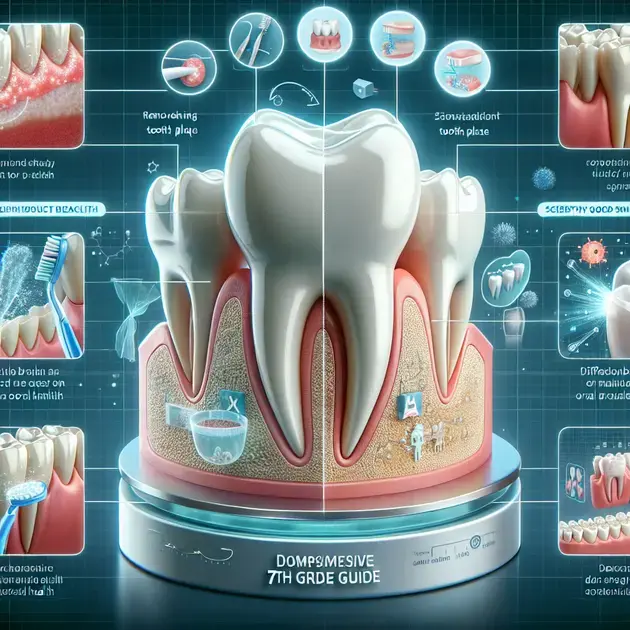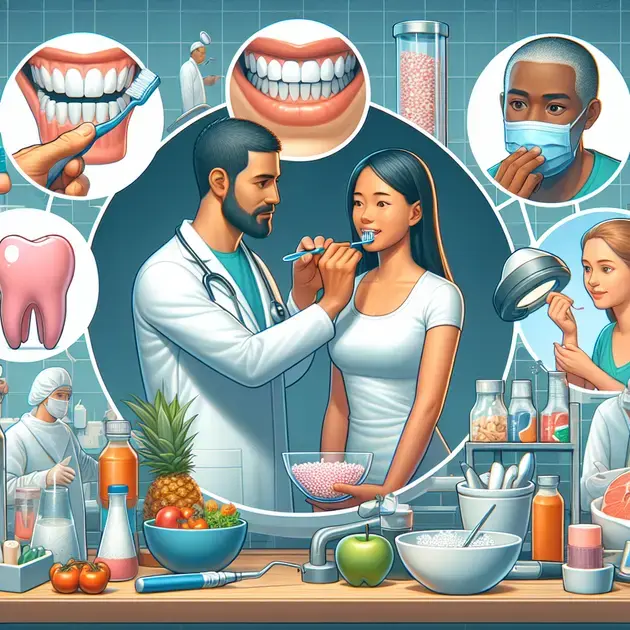Are you ready to learn how to Eliminate Tooth Plaque? In this ultimate guide tailored specifically for 7th graders, you will discover effective strategies to keep your smile healthy and bright.
Plaque buildup on teeth is a common issue that can lead to cavities and gum disease if not properly addressed. With the tips and techniques outlined in this guide, you will be equipped to tackle plaque and maintain optimal oral hygiene.

Discover the Importance of Tooth Plaque Removal
Tooth plaque is a sticky film of bacteria that forms on your teeth and can lead to various dental issues if not removed regularly. Understanding the importance of tooth plaque removal is crucial for maintaining good oral health. Here are some easy-to-follow tips to help you effectively remove tooth plaque:
1. Brush Your Teeth Twice a Day
One of the most basic yet essential steps in removing tooth plaque is to brush your teeth at least twice a day. Use a fluoride toothpaste and a soft-bristled brush to clean all surfaces of your teeth thoroughly.
2. Floss Daily
In addition to brushing, it’s important to floss your teeth daily to remove plaque and food particles from between your teeth and along the gumline. Use dental floss or interdental brushes to clean these hard-to-reach areas effectively.
3. Use Mouthwash
Adding an anti-plaque or antimicrobial mouthwash to your oral hygiene routine can help reduce plaque buildup and kill bacteria in your mouth. Swish the mouthwash in your mouth for the recommended time before spitting it out.
4. Maintain a Balanced Diet
Eating a balanced diet rich in fruits, vegetables, and whole grains can contribute to good oral health and reduce plaque formation. Limit sugary and acidic foods that can increase plaque accumulation.
5. Visit Your Dentist Regularly
Scheduling regular dental check-ups and cleanings is essential for professional plaque removal and monitoring your oral health. Your dentist can identify any plaque buildup or early signs of dental issues and provide appropriate treatment.
Easy-to-Follow Tips for Removing Tooth Plaque
When it comes to maintaining a healthy smile, following easy-to-follow tips for removing tooth plaque is key. Implementing simple strategies into your daily oral care routine can help prevent plaque buildup and protect your teeth and gums. Here are some effective techniques to keep your smile bright and healthy:
1. Invest in an Electric Toothbrush
Consider using an electric toothbrush with oscillating or rotating bristles for more effective plaque removal compared to manual brushing. Follow the manufacturer’s instructions on how to use the toothbrush properly for optimal results.
2. Try Oil Pulling
Oil pulling is an ancient technique that involves swishing oil in your mouth to remove bacteria and plaque. Coconut oil is a popular choice for oil pulling, known for its antimicrobial properties that can help improve oral hygiene.
3. Chew Sugar-Free Gum
Chewing sugar-free gum after meals can stimulate saliva production, which helps wash away food debris and neutralize acids in your mouth. Look for gum containing xylitol, a sugar substitute that can prevent plaque formation.
4. Use a Water Flosser
A water flosser, also known as a water pick, uses a stream of water to clean between your teeth and along the gumline. This device can be a convenient and effective tool for removing plaque and improving gum health.
5. Limit Snacking Between Meals
Frequent snacking can increase plaque buildup on your teeth, especially if you consume sugary snacks. Try to limit snacking between meals and opt for healthier choices like fresh fruits or vegetables to promote better oral hygiene.
Maintain a Healthy Smile: Effective Strategies for 7th Graders
For 7th graders, developing good oral hygiene habits is essential for maintaining a healthy smile as they transition into their teenage years. Encouraging effective strategies for dental care at this age can set the foundation for a lifetime of good oral health. Here are some tips specifically tailored for 7th graders:
1. Set a Daily Oral Care Routine
Help 7th graders establish a daily oral care routine that includes brushing their teeth twice a day and flossing at least once a day. Emphasize the importance of consistent oral hygiene practices for preventing plaque buildup and cavities.
2. Demonstrate Proper Brushing and Flossing Techniques
Show 7th graders the correct way to brush their teeth using gentle circular motions and to floss in between each tooth to remove plaque effectively. Proper technique demonstration can ensure they are caring for their teeth correctly.
3. Encourage Healthy Eating Habits
Encourage 7th graders to choose nutritious foods and limit sugary snacks and beverages that can contribute to plaque formation and tooth decay. Educate them on the importance of a balanced diet for overall oral health.
4. Stress the Importance of Regular Dental Visits
Emphasize the significance of attending regular dental check-ups and cleanings to monitor their oral health and receive professional cleanings. Encourage 7th graders to communicate any dental concerns or issues with their dentist.
5. Address Orthodontic Needs Early
If orthodontic treatment is necessary for 7th graders, discuss the importance of addressing any alignment issues or bite problems promptly. Early orthodontic intervention can help prevent plaque buildup and maintain proper oral health.

Understand the Dangers of Untreated Tooth Decay
Untreated tooth decay can lead to serious oral health issues if ignored. When plaque builds up on the teeth, it produces acids that can slowly erode the enamel, leading to cavities. If these cavities are left untreated, they can progress and reach the inner layers of the tooth, causing pain and potential infection. Over time, this can result in the need for more invasive and costly dental treatments.
Ignoring untreated tooth decay can also lead to more severe consequences, such as gum disease. As the decay progresses, it can affect the gums, causing inflammation and potential infection. This can lead to gum recession, bone loss, and even tooth loss if not addressed promptly by a dental professional.
Furthermore, untreated tooth decay can have an impact on overall health. The bacteria present in the mouth due to decay can enter the bloodstream and potentially cause systemic health issues. Studies have shown links between untreated tooth decay and conditions such as heart disease, diabetes, and respiratory infections. Therefore, it is crucial to address tooth decay promptly to maintain not only oral health but also overall well-being.
Regular dental check-ups are essential to detect and treat tooth decay early on. Dentists can identify signs of decay during routine exams and provide appropriate treatments to prevent further progression. By understanding the dangers of untreated tooth decay and prioritizing regular dental visits, individuals can maintain optimal oral health and prevent more serious complications down the line.
The Link Between Diet and Oral Health
The connection between diet and oral health is undeniably strong. Consuming sugary and acidic foods and beverages can contribute to the development of tooth decay and cavities. These substances can weaken the enamel and provide an ideal environment for bacteria to thrive, leading to decay. Poor dietary choices can also impact gum health, increasing the risk of gum disease and inflammation.
On the other hand, a balanced and nutritious diet can promote good oral health. Foods rich in essential nutrients like calcium, vitamin C, and antioxidants can strengthen the teeth and gums, reducing the risk of decay and gum disease. Crunchy fruits and vegetables can also help clean the teeth and stimulate saliva production, which plays a role in protecting against cavities.
It is important to be mindful of dietary choices and their impact on oral health. Limiting the consumption of sugary snacks and beverages, opting for water instead of sugary drinks, and incorporating tooth-friendly foods can make a significant difference in maintaining a healthy smile. By understanding the link between diet and oral health, individuals can take proactive steps to support their overall well-being.
In addition to a balanced diet, regular dental check-ups are crucial for monitoring oral health and addressing any concerns promptly. Dentists can provide guidance on dietary choices that promote oral health and recommend treatments to mitigate the effects of poor dietary habits. By prioritizing a nutritious diet and regular dental visits, individuals can achieve and maintain a healthy smile for years to come.
Importance of Regular Dental Check-ups
Scheduling regular dental check-ups is essential for maintaining optimal oral health. During these visits, dentists can perform thorough examinations to detect any signs of decay, gum disease, or other oral health issues. Early detection allows for prompt intervention, preventing problems from worsening and requiring more extensive treatments.
Regular dental check-ups also include professional cleanings to remove plaque and tartar buildup that cannot be effectively addressed through at-home oral hygiene practices alone. This preventive measure helps reduce the risk of decay and gum disease, promoting a healthier mouth overall. Dentists can also offer personalized oral hygiene advice and tips for maintaining good oral health between visits.
Furthermore, dental check-ups offer an opportunity to discuss any concerns or goals regarding oral health with the dentist. Whether seeking cosmetic improvements or addressing discomfort, regular visits allow for open communication and collaboration to achieve the desired outcomes. Dentists can tailor treatment plans to meet individual needs and preferences, ensuring optimal results.
By prioritizing regular dental check-ups, individuals can proactively manage their oral health and address any issues before they escalate. Consistent care and monitoring by a dental professional contribute to long-term oral health and overall well-being. Investing in regular check-ups not only maintains a healthy smile but also supports a higher quality of life through improved oral health.
Conclusion
In conclusion, the dangers of untreated tooth decay should not be underestimated, as they can lead to serious oral health issues if ignored. From the development of cavities to potential gum disease and systemic health problems, the repercussions of neglecting tooth decay can be far-reaching. Therefore, it is imperative to address decay promptly to maintain both oral health and overall well-being.
The link between diet and oral health highlights the importance of making mindful dietary choices. By opting for a balanced and nutritious diet rich in essential nutrients, individuals can promote good oral health and reduce the risk of decay and gum disease. Understanding how dietary habits impact oral health empowers individuals to take proactive steps in supporting their well-being.
Regular dental check-ups play a crucial role in maintaining optimal oral health. Through early detection, professional cleanings, and personalized oral hygiene advice, dentists can help individuals prevent and address oral health issues effectively. By prioritizing regular check-ups, individuals can proactively manage their oral health, leading to a healthier smile and an improved quality of life in the long run.